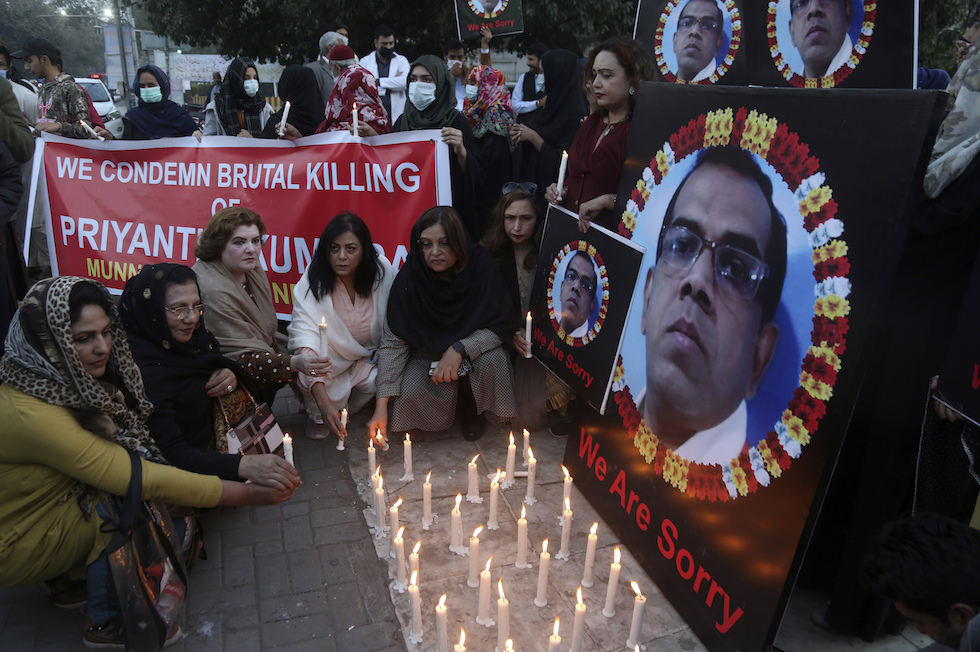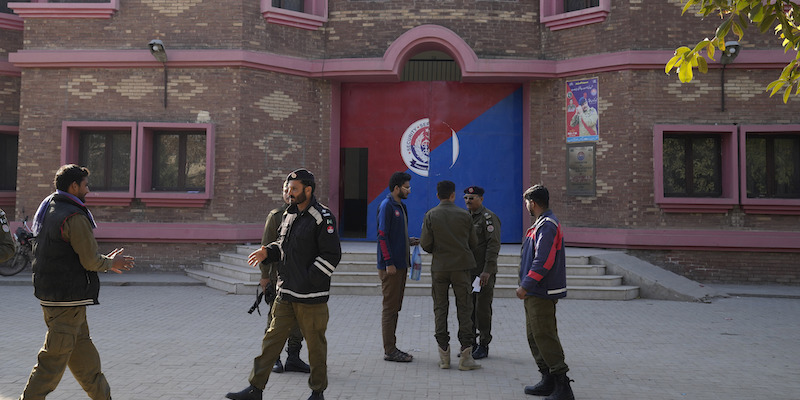On Saturday in Pakistan, a man who was in police custody on charges of blasphemy was abducted and killed by mobs. Over a hundred men stormed the police station, dragged him outside and beat him to death. Lynchings for religious reasons are quite common in Pakistan, as are accusations of blasphemy, often used to intimidate religious minorities or to resolve personal issues.
The latest case occurred in Warburton, near Nankana Sahib in the north eastern province of Punjab. The man in police custody was called Muhammad Waris, he was in his thirties and was accused of having desecrated some pages of the Koran. Local newspapers said Waris had pasted pictures of himself, his wife and a knife on various pages of a copy of the Koran. His gesture had been seen by some Muslim residents of Warburton, who had started beating him.
The first lynching by the crowd he had been interrupted by the police, who had taken him and imprisoned him on charges of blasphemy.
A man points to the home of Muhammad Waris, who was lynched by the mob (AP Photo/KM Chaudary)
A few hours after his confinement, a rather large crowd had gathered around the police station, as evidenced by some videos: a wooden ladder was enough to pass the central door, without opposition from the police. Once the door was opened, the mob stormed the station, took Waris from his cell and dragged him naked into the street, where he was beaten to death, even with sticks and metal rods. Second a police spokesman the crowd had been interrupted by the intervention of additional police units as they tried to burn the victim’s body, which happens on many occasions after lynchings.
Total madness!!! An angry mob attacked the police station in Nankana Sahib. Reportedly an accused of blasphemy was killed and body burnt by the mob. Apparently police was unable to control the situation. pic.twitter.com/1kdNGFmqro
— Shiraz Hassan (@ShirazHassan) February 11, 2023
In Pakistan, the Islamic state, the law also provides for the death penalty as a punishment for blasphemous acts. When trials are not preceded by summary justice by the crowd, they often have a written verdict: acquitting an accused of blasphemy can be dangerous for the judges themselves.
The last case of lynching for suspected blasphemy to have had a certain international relevance was that of Priyantha Diyawadana, a Sri Lankan citizen and company manager, accused of having torn up some posters bearing phrases of Mohammed: it was he was beaten to death by the mob and his body was burned. Subsequent investigations found that the allegations were false and that the manager had been the victim of a private vendetta by some employees who had incited the mob.

A commemoration of the Sri Lankan manager killed in Pakistan (AP Photo/KM Chaudary)
According to many local and international human rights organizations, it was a rather exemplary case of how blasphemy charges are being used in Pakistan. Second a relationship of the Pakistan Human Rights Commission in the two-year period between 2021 and 2022 there were 585 blasphemy complaints registered by the police in the country, with a high concentration in the Punjab region.
Saturday’s lynching was condemned by Pakistan’s prime minister Shehbaz Sharif, which also ordered investigations into police conduct. These are also quite usual reactions, which have been repeated in different cases with different prime ministers. The problem is that Pakistan has never really addressed the issue and above all has never questioned the very strict blasphemy law, already at the center of international controversy over the case of Asia Bibi, an eleven-year-old Christian girl sentenced to death for blasphemy and acquitted only eight years later under strong pressure from the international community.
On the contrary, the law against blasphemy has been tightened in the first weeks of 2023, by decision of the Parliament: if insulting the Koran or the Prophet Mohammed could already lead to a death sentence, now also acts and words against the prophet’s relatives can be punished with ten years in prison, extendable up to life imprisonment in case of certain aggravating circumstances. Pakistan inherited a 19th-century British Empire law on blasphemy, and since the 1980s it has tightened it and increased the penalties. Today it is one of three countries in the world, together with Brunei and Mauritania, to provide for the death penalty for blasphemy.
However, Pakistan is not the only country in the area where lynchings and accusations for religious reasons are frequent: even in India they are quite common, conducted mostly by Hindu people against Sikh and Islamic minorities. They are favored by legislation that fails to counter violent demonstrations by the crowd and are sometimes indirectly fueled by politics, which exploits religious divisions to generate consensus. Narendra Modi’s Hindu ruling party in recent years has moved to positions that are increasingly defined as “religious extremism”.
– Read also: The destruction of the Ayodhya mosque, thirty years ago
